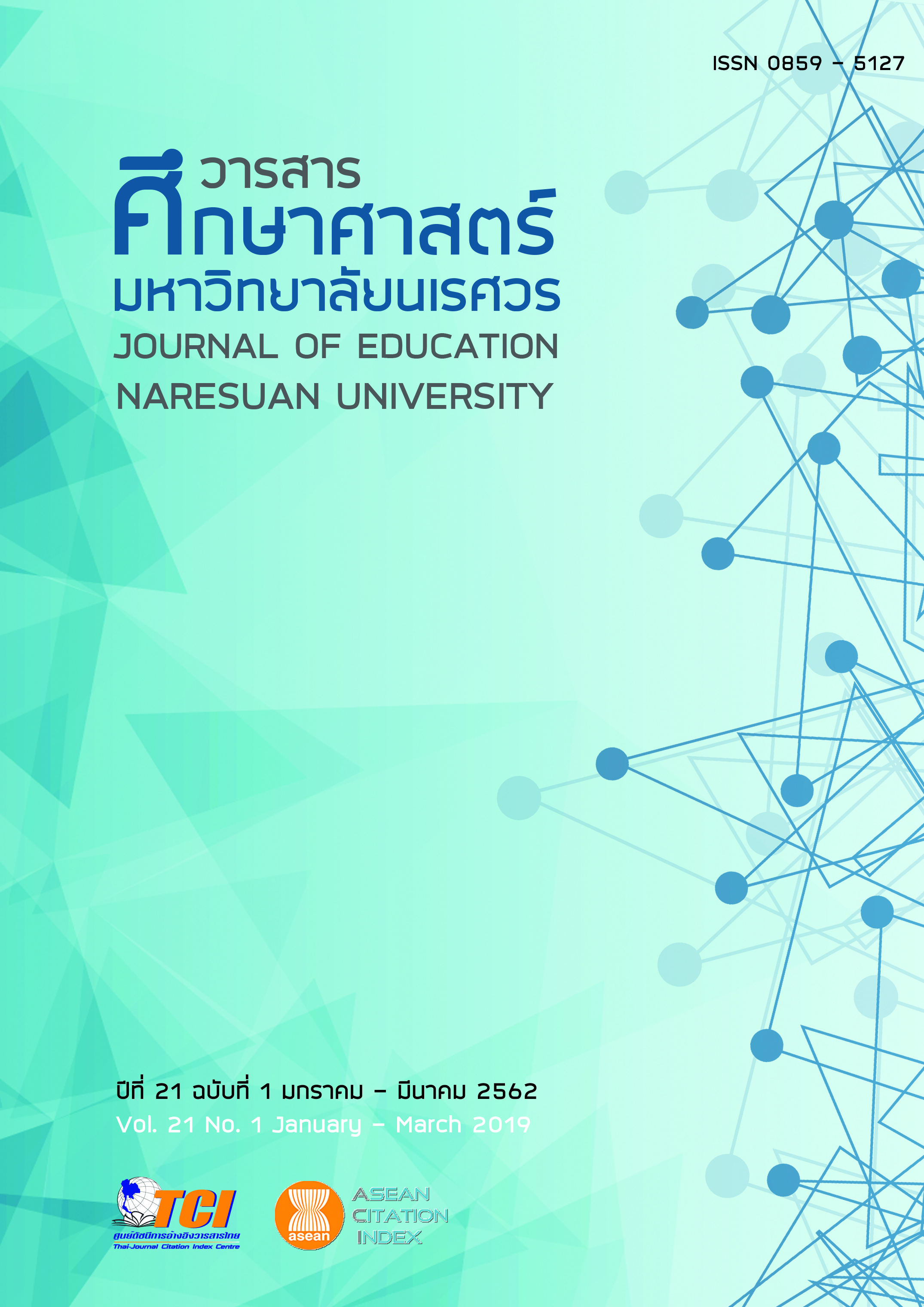รูปแบบการเรียนรู้โดยใช้โครงงานเป็นฐานเพื่อส่งเสริมความสามารถในการทำวิจัยในชั้นเรียนของนักศึกษาครูสาขาช่างอุตสาหกรรม (ACTIVITY-BASED LEARNING MODEL TO ENHANCE LEARNING CLASSROOM ACTION RESEARCH ABILITY FOR PRE-SERVICE TEACHERS OF INDUSTRIAL EDUCATION)
Main Article Content
Abstract
การวิจัยนี้มีวัตถุประสงค์เพื่อ 1) พัฒนารูปแบบการเรียนรู้โดยใช้โครงงานเป็นฐานเพื่อส่งเสริมความสามารถในการทำวิจัยในชั้นเรียนของนักศึกษาครูสาขาช่างอุตสาหกรรม 2) ศึกษาความสามารถในการทำวิจัยในชั้นเรียน 3) เปรียบเทียบผลสัมฤทธิ์ทางการเรียนด้านวิจัยของนักศึกษาครูสาขาช่างอุตสาหกรรม และ 4) ศึกษาความพึงพอใจที่มีต่อรูปแบบการเรียนรู้ฯ กลุ่มตัวอย่างเป็นนักศึกษาครูช่างสาขาวิชาวิศวกรรมอุตสาหการ ชั้นปีที่ 4 (หลักสูตร 5 ปี) จำนวน 50 คน เครื่องมือในการวิจัย ประกอบด้วย แผนการจัดการเรียนรู้โดยใช้โครงงานเป็นฐาน แบบประเมินความสามารถในการทำวิจัยในชั้นเรียน แบบวัดผลสัมฤทธิ์ทางการเรียนด้านวิจัย และแบบสอบถามความพึงพอใจที่มีต่อรูปแบบการเรียนรู้เป็นฐาน ดำเนินการทดลองใช้รูปแบบรอบที่ 1 กับนักศึกษาสาขาวิชาวิศวกรรมเครื่องกล ชั้นปีที่ 3 ภาคเรียนที่ 2 ปีการศึกษา 2557จำนวน 38 คน และ ทดลองรอบที่ 2 กับนักศึกษาสาขาวิชาวิศวกรรมอุตสาหการ ชั้นปีที่ 4 ภาคเรียนที่ 1 ปีการศึกษา 2558 จำนวน 28 คน และใช้จัดการเรียนรู้กับกลุ่มตัวอย่าง ในภาคเรียนที่ 1 ปีการศึกษา 2559 สถิติในการวิเคราะห์ข้อมูลได้แก่ ค่าเฉลี่ย ส่วนเบี่ยงเบนมาตรฐาน และ สถิติที (Dependent samples t—test) ผลการวิจัย พบว่า รูปแบบการเรียนรู้โดยใช้โครงงานเป็นฐานที่พัฒนาขึ้น ได้บูรณาการจัดการเรียนรู้โดยให้แนวคิด และ หลักการวิจัย ควบคู่กับการปฏิบัติกิจกรรมการวิจัย หลักการของรูปแบบเน้นให้ผู้เรียนเกิดการเรียนรู้ความสามารถในการทำวิจัยด้วยการ “ปฏิบัติการทำโครงงานวิจัย” จนครบกระบวนการทำวิจัย โดยผู้สอนเป็นผู้อำนวยความสะดวก และเป็นพี่เลี้ยงให้คำชี้แนะ และอิงรูปแบบการเรียนแบบผสมผสาน จัดการเรียนรู้ในห้องเรียนแบบเน้นการปฏิบัติกิจกรรมการวิจัยตามเป้าหมายในแต่ละสัปดาห์ และมีเฟสบุ๊คกลุ่ม เป็นสื่อกลางในการเสนอสื่อการเรียนรู้ สื่อประกอบการบรรยาย ตัวอย่างงานวิจัย กิจกรรมต่างๆ ที่ผู้เรียนดำเนินการในห้องเรียน สื่อกลางเพื่อเสนอข้อมูลกิจกรรมการเรียนรู้ในแต่ละสัปดาห์ และเป็นศูนย์กลางในการติดต่อสื่อสารและขอคำปรึกษานอกเวลาเรียน แบ่งเนื้อหาออกเป็น 7 โมดูล ประกอบด้วย 1) กำหนดโจทย์วิจัย 2) การทบทวนวรรณกรรมที่เกี่ยวข้อง 3) กำหนดขอบเขตการวิจัย 4) เครื่องมือวิจัย 5) วิธีดำเนินการวิจัย 6) การเก็บรวบรวมข้อมูลและ วิเคราะห์ข้อมูล 7) การเขียนรายงานวิจัย เวลาในการดำเนินการจัดการเรียนรู้รวม 15 สัปดาห์ แต่ละโมดูลมีขั้นตอนการจัดการเรียนรู้ 5 ขั้นตอน ได้แก่ 1) รับรู้เป้าหมายงาน 2) เรียนรู้หลักการ 3) ฝึกปฏิบัติการวิจัย 4) เสนอผลการปฏิบัติการวิจัย และ 5) รับการประเมินผลการทำวิจัย ข้อเสนอแนะ และปรับปรุง (Formative Assessment) และ เมื่อจัดการเรียนรู้ครบ 15 สัปดาห์แล้วทำการวัดผลความสมบูรณ์และถูกต้องจากการเขียนรายงานการวิจัยฉบับสมบูรณ์ได้อย่างถูกต้องตามหลักการวิจัย เพื่อตัดสินผล (Summative Evaluation) จากคะแนนของผู้ประเมินงานวิจัย 2 คน และพบว่า กลุ่มตัวอย่างมีความสามารถในการทำวิจัยอยู่ในระดับดีมาก มีคะแนนผลสัมฤทธิ์ทางการเรียนวิชาวิจัยทางการศึกษาหลังเรียนสูงกว่าก่อนเรียนอย่างมีนัยสำคัญทางสถิติที่ระดับ .05 และมีความพึงพอใจต่อรูปแบบการจัดกิจกรรมการเรียนรู้โดยรวมอยู่ในระดับมาก
ACTIVITY-BASED LEARNING MODEL TO ENHANCE LEARNING CLASSROOM ACTION RESEARCH ABILITY FOR PRE-SERVICE TEACHERS OF INDUSTRIAL EDUCATION
This research was aimed to develop Activity-Based Learning Model to Enhance Learning Classroom Action Research Ability for Pre-service Teachers of Industrial Education; study the research ability; study learning achievement of pre-service teachers in industrial education; and study the satisfaction of pre-service teachers in industrial education who studied with activity-based learning. The sample group were 50 pre-service teachers of 4th year majoring in industrial engineering, the research instruments were project-based learning lesson plans, research ability evaluation form, achievement test, and evaluating students’ satisfaction questionnaire. First Tried out model with 38 pre-service teachers of 3rd year majoring in mechanical engineering in the 2nd semester of 2014 academic year, and second tried out model with 28 pre-service teachers of 4th year majoring in industrial engineering in the 1st semester of 2015 academic year. Implementing model with 50 sample group in the 1st semester of 2016 academic year. The data was analyzed by Mean, Standard Deviation, and Dependent samples t-test. The research findings were; The project-based learning model was designed to teach the research principle together with practical in research. The instructor took the role as facilitator and mentor. The learning process used blended learning aspect by activity based learning in the classroom and used Facebook as a channel for presenting instructional media, media in lecture, research examples, classroom learning activities, weekly learning information, communication center and scaffolding. The learning process composed of 5 steps: 1) goal perception, 2) principle learning, 3) research in action, 4) present the result, and 5) research evaluation, suggestion and improvement. The content of 7 modules in activity based learning model composed of 1) identify the research questions, 2) review related literature and researches, 3) identify the research limitation, 4) research instruments, 5) research methodology, 6) data collection and analysis, and 7) research writing. The learning activity lasted 15 weeks long. The research ability was evaluated by the correctness in research writing as the principle of research. The sample group gained the research ability at the level of “very good”, had a posttest score significantly higher than the pretest score at the level of .05., and satisfied the activity based learning model at the level of “much”.
Article Details
The owner of the article does not copy or violate any of its copyright. If any copyright infringement occurs or prosecution, in any case, the Editorial Board is not involved in all the rights to the owner of the article to be performed.
References
Bleach, J. (2014). Improving numeracy outcomes for children through community action research. Educational Action Research, 23(1), 22- 35.
Craig, S. W., & James, A. W. (2003). An instructor’s guide to understanding test reliability.
Testing & Evaluation Services, University of Wisconsin. Retrieved from https://testing.wisc.edu/Reliability.pdf
Jammor, P., Prasarnpun, S. Kaewurai, W., & Lhincharoen, A. (2016). A development of blended learning management model in biology using resource based learning to enhance learning ability for high school students. Journal of Education Naresuan University, 18(2), 37-49. [in Thai]
Khaemani, T. (2013). Teaching science knowledge for the efficiency process of learning (17th ed). Bangkok: Chulalongkorn University Press. [in Thai]
Moomark, M., Onthanee, A., Kaewurai, W., & Lhincharoen, A. (2016). A curriculum development to enhance classroom action research competency with knowledge management network for teachers. Journal of Education Naresuan University, 18(1), 1-9. [in Thai]
Niemi, R., Kumpulainen, K., & Lipponen, L. (2015). Pupils’ documentation enlightening teachers’ practical theory and pedagogical actions. Educational Action Research, 23(4), 599-614.
Office of Higher Education Commission. (2011). Curriculum of teacher production at present. Journal of Higher Education, 37(392), 11. [in Thai]
Office of the Education Council. (2007). Project-based learning. Bangkok: The Agricultural Cooperative Federation of Thailand. [in Thai]
Office of the National Education Commission. (2002). National Education Acts, B.E. 2542. Office of the National Education Commission, Bangkok. [in Thai]
Prachanban, P. (2017). The development of the factors, indicators and criteria for the evaluation of research mind of graduate researchers. Journal of Education Naresuan University, 19(1), 11-22. [in Thai]
Ulvik, M. (2014). Student-teachers doing action research in their practicum: why and how? Educational Action Research, 22(4), 518-533.
Wongdee, P., Yampinit, S., Mejareurn, S., & Chimphlee, W. (2016). Analysis of learning effectiveness to enhance research ability of pre-service teachers in industrial technology education. KMUTT Research and Development Journal, 39(4), 597-614. [in Thai]


